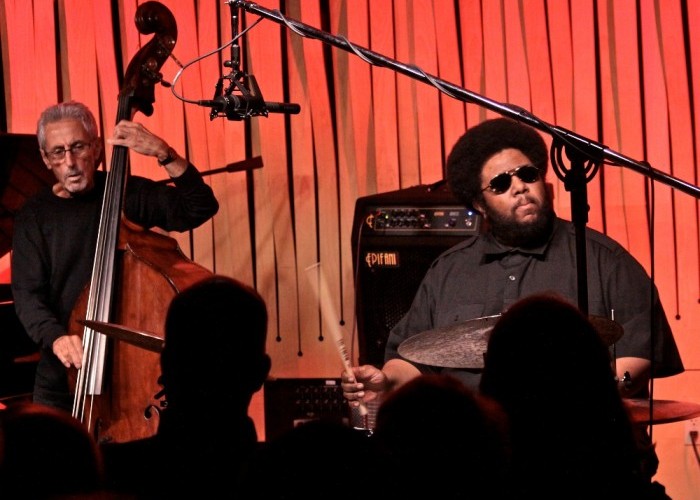Jan 13, 2026 2:09 PM
More Trump-Kennedy Center Cancellations
The fallout from the renaming of the John F. Kennedy Center for the Performing Arts to include President Donald…

Bassist-composer Mario Pavone (left) led his Dialect Trio, which also includes drummer Tyshawn Sorey and pianist Matt Mitchell, through a pair of sets Friday, May 18 at Firehouse 12 in New Haven, Connecticut.
(Photo: Maurice Robertson)Bassist-composer and Connecticut’s favorite son Mario Pavone brought his dynamic Dialect Trio—featuring outstanding pianist Matt Mitchell and prodigious drummer Tyshawn Sorey—to the intimate and acoustically brilliant Firehouse 12 performance space in New Haven for two compelling sets on Friday, May 18.
The 75-seat venue was packed with longtime Pavone fans, many of whom remembered the bandleader from his longstanding collaboration during the ’80s and ’90s with the late Thomas Chapin, a few even able to recall as far back as his work with Paul Bley in the early ’70s. A stalwart bassist, who is approaching his 78th birthday this November, Pavone anchored this gestalt trio with a big, woody tone and resolute demeanor. His lines were succinct and clear, and his chording behind Mitchell’s piano solos forceful and unshakable, providing an anchor for this uncannily interactive trio, as they performed material from their 2017 Playscape album, Chrome, along with other Pavone originals.
Pavone’s compositional style involves intricate heads, generally played in unison by bass and piano (as on “Beige” and “Conic”), before opening up to expansive improvisations and ultimately resolving back to the strictly arranged material. Mitchell, an intensely probing pianist and also a member of Tim Berne’s Snakeoil, among other cutting edge ensembles, served as a perfect complement to Pavone, often referring to the charts spread out on his piano during some of the thornier heads, as on “Poles” (from 2013’s Arc Trio) and the frenetic “Chrome,” which also had Sorey joining in on the tricky unisons.
Multi-instrumentalist Sorey, a John D. and Catherine T. MacArthur Foundation Fellowship winner in 2017, is an explosive drummer with a composer’s mind and an unpredictable nature. Throughout the set, he was as likely to explore a cymbal for its ringing overtones and summon myriad timbres and textures on the kit with sticks and brushes (as on the spacious “Beige”) as he was likely to slam with the fierce polyrhythmic authority of Jeff “Tain” Watts, unleashed. At other times, he played with the understated kinetic pulse of Sunny Murray.
A rendition of Pavone’s “Reflections,” from 2015’s Blue Dialect (not to be confused with Thelonious Monk’s “Reflections”), was jaunty, swinging and Monkish, underscored by Sorey’s loose shuffle-swing beat and colored by Mitchell’s frisky excursions on the keys, with allusions to “Straight No Chaser” along the way. At one point, Mitchell laid out entirely on this tune, leaving Pavone and Sorey to explore their own unique dialect together in dramatic fashion. And on “Vertical” (the title track of Pavone’s 2017 sextet album on Clean Feed), bassist, pianist and drummer engaged in a kind of pointillistic code talk that opened up to some freewheeling conversations.
They closed on a kinetic note with “Conic” (from Chrome), which had Mitchell cascading over the keys, Pavone pedaling furiously and Sorey bashing with abandon. Their second set featured more material from Chrome, including “Ancestors,” “Glass 10” and “The Lizards (from Jim Jarmusch),” each delivered with that same perfect balance between composition and improvisation that is at the heart of Pavone’s writing.
With two albums and several gigs under their belt, this potent trio keeps honing its telepathy, while collectively pushing the envelope from set to set. DB

Belá Fleck during an interview with Fredrika Whitfield on CNN.
Jan 13, 2026 2:09 PM
The fallout from the renaming of the John F. Kennedy Center for the Performing Arts to include President Donald…

Peplowski first came to prominence in legacy swing bands, including the final iteration of the Benny Goodman Orchestra, before beginning a solo career in the late 1980s.
Feb 3, 2026 12:10 AM
Ken Peplowski, a clarinetist and tenor saxophonist who straddled the worlds of traditional and modern jazz, died Feb. 2…

The success of Oregon’s first album, 1971’s Music Of Another Present Era, allowed Towner to establish a solo career.
Jan 19, 2026 5:02 PM
Ralph Towner, a guitarist and composer who blended multiple genres, including jazz — and throughout them all remained…

Rico’s Anti-Microbial Instrument Swab
Jan 19, 2026 2:48 PM
With this year’s NAMM Show right around the corner, we can look forward to plenty of new and innovative instruments…

Richie Beirach was particularly renowned for his approach to chromatic harmony, which he used to improvise reharmonizations of originals and standards.
Jan 27, 2026 11:19 AM
Richie Beirach, a pianist and composer who channeled a knowledge of modern classical music into his jazz practice,…